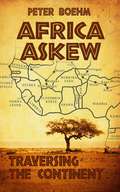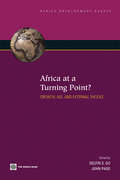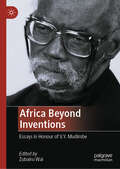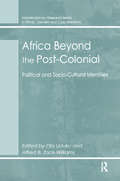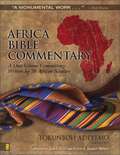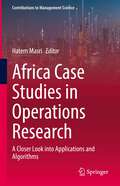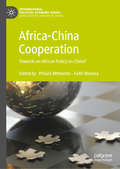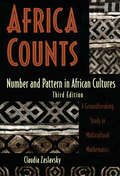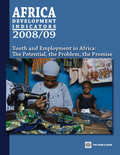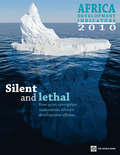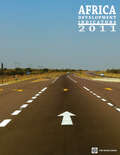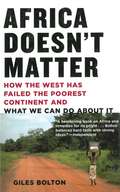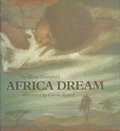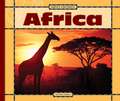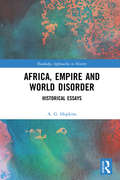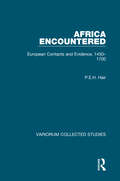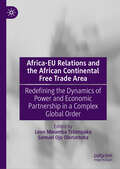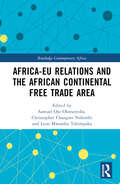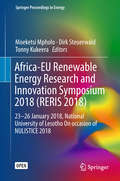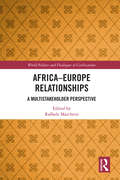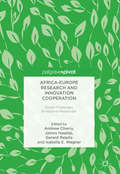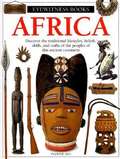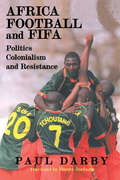- Table View
- List View
Africa Askew - Traversing The Continent
by Peter BoehmAFRICA ASKEW was in the Top Ten of the German Amazon Travel&Adventure section for almost a year.Peter Boehm travelled right across Africa, in speeding SUVs, rickety buses and dilapidated trains. He travelled for almost six months, over 6,000 miles, through nine countries – Somalia, Djibouti, Ethiopia, Sudan, Chad, Nigeria, Niger, Mali and Senegal.The journey was breathtaking and nerve-shattering, but never dull. The people he met were exciting, bizarre and pathetic, but they never leave you cold. In Somali, Peter Boehm describes psychiatrists who consider all their compatriots to be mad – as do the Somalis themselves and, in the end, even the author thinks he’s mad too! In Sudan, he meets doctors who re-seal women; in Chad there are street kids already sitting on their suitcases, awaiting the journey to Germany; in Mali he meets traditional healers who are, at the same time, GPs, best friends, and agony aunts; in Nigeria there are traditional leaders whose subjects throw themselves on the ground before them, and Islamic judges who savour the whippings they’ve ordered as one would a high-quality wine.For good measure, Peter Boehm has kept a record of the troubles and transformations of a European in Africa.Peter Boehm’s tone is laconic, and free of any sentimentality. You’ll never have read about Africa like this before.
Africa at a Turning Point? Growth, Aid, and External Shocks
by Delfin Sia Go John PageSince the mid-1990s, sub-Saharan Africa has experienced an acceleration of economic growth that has produced rising incomes and faster human development. However, this growth contrasts with the continent's experience between 1975 and 1995, when it largely missed out on two decades of economic progress. This disparity between Africa's current experience and its history raises questions about the continent's development. Is there a turnaround in Africa's economy? Will growth persist? 'Africa at a Turning Point?' is a collection of essays that analyzes three interrelated aspects of Africa's recent revival. The first set of essays examines Africa's recent growth in the context of its history of growth accelerations and collapses. It seeks to answer such questions as, is Africa at a turning point? Are the economic fundamentals finally pointing toward more sustainable growth? The second set of essays looks at donor flows, which play a large role in Africa's growth. These essays focus on such issues as the management and delivery of increased aid, and the history and volatility of donor flows to Africa. The third set of essays considers the recent impact of one persistent threat to sustained growth in Africa: commodity price shocks, particularly those resulting from fluctuations in oil prices.
Africa Beyond Inventions: Essays in Honour of V.Y. Mudimbe
by Zubairu WaiAfrica Beyond Inventions is a rich critical engagement with the work of V.Y. Mudimbe. For decades, Mudimbe advanced a distinctive and erudite critical project that contributes to various bodies of knowledge in fields such as philosophy, anthropology, theology, postcolonial studies, decolonial theory, literary criticism, cultural studies, prose fiction, and African studies more broadly. A decade after his retirement and in the expansive spirit of his work, this volume stages a productive engagement with Mudimbe’s remarkable and capacious body of work and the conceptual, epistemic, methodological, and ethical challenges it poses for the modern disciplines, specifically in relation to Africa. It situates Mudimbe in his proper place as a complex and significant thinker whose extraordinary contributions to various bodies of knowledge deserves to be recognised and better apprehended for what it has taught and continues to teach about the discursivity of the modern disciplines and the possibility of decolonising their colonising imprints in a moment that has been characterised as a decolonial turn. Through these engagements, the volume honours the intellectual legacy of one of Africa’s most brilliant minds and make his work accessible to a new generation of readers.
Africa Beyond the Post-Colonial: Political and Socio-Cultural Identities (Interdisciplinary Research Series in Ethnic, Gender and Class Relations)
by Alfred B. Zack-WilliamsThe poor economic performance of some African countries since independence has been a major concern to both African leaders and policy makers. This volume, which draws together contributions from academics based in Africa and its diaspora, situates the continent within its historic and socio-political background: from the 1960s, the decade of independence, through to its development outlook as the new millennium unfolds. It examines a broad range of contemporary issues -- from development and culture to linguistics and is unique in identifying and examining issues that are common both to Africa and the diaspora.
Africa Bible Commentary: A One-Volume Commentary Written by 70 African Scholars
by Tokunboh AdeyemoThe Africa Bible Commentary is a unique publishing event—the first one-volume Bible commentary produced in Africa by African theologians to meet the needs of African pastors, students, and lay leaders. Interpreting and applying the Bible in the light of African culture and realities, it furnishes powerful and relevant insights into the biblical text that transcend Africa in their significance. The Africa Bible Commentary gives a section-by-section interpretation that provides a contextual, readable, affordable, and immensely useful guide to the entire Bible. Readers around the world will benefit from and appreciate the commentary’s fresh insights and direct style that engage both heart and mind. Key features: · Produced by African biblical scholars, in Africa, for Africa—and for the world · Section-by-section interpretive commentary and application · More than 70 special articles dealing with topics of key importance in to ministry in Africa today, but that have global implications · 70 African contributors from both English- and French-speaking countries · Transcends the African context with insights into the biblical text and the Christian faith for readers worldwide
Africa Case Studies in Operations Research: A Closer Look into Applications and Algorithms (Contributions to Management Science)
by Hatem MasriThis book presents contributions to the 50th Annual Conference of the Operations Research Society of South Africa (ORSSA), which was jointly hosted with the African Federation of Operations Research Societies (AFROS) at North-West University in Potchefstroom, South Africa from 12 to 15 September, 2021. Focusing on innovative case studies and recent applications of Operations Research models and algorithms in African countries, each chapter highlights findings emerging from the countries in question and explains the lessons learned. As such, the book offers an up-to-date overview of Operations Research practices and developments in Africa. AFROS is a “not for profit” organization that aims to promote Operations Research in Africa. Its affairs are regulated by an Executive Committee consisting of representatives/alternates of all its member societies. The members of the Federation undertake to co-operate in the advancement of knowledge, interest and education in Operations Research by appropriate means, particularly the exchange of information, the holding of meetings and conferences, and the awarding of prizes.
Africa-China Cooperation: Towards an African Policy on China? (International Political Economy Series)
by Philani Mthembu Faith MaberaThis book offers a range of perspectives on the Africa–China partnership in the context of the Forum on China and Africa Cooperation (FOCAC). Incorporating historical, political, social and cultural dimensions, it offers innovative views on the Africa–China relationship that combine theory and practice, and critically examines the prospects of a Pan-African policy towards China, complementary to China’s comprehensive African policy. The chapters address a number of key questions, including: What steps are being taken to achieve a more coordinated approach and policy towards China on the African continent? Does Africa even need a collective strategy in the first place? How would a coherent policy framework affect Africa’s relations with Europe and other external partners? How do the pillars of the partnership align with the African Union’s Agenda 2063 and the United Nation’s 2030 Agenda for Sustainable Development?
Africa Counts: Number and Pattern in African Cultures
by Claudia ZaslavskyThis fascinating study of mathematical thinking among sub-Saharan African peoples covers counting in words and in gestures; measuring time, distance, weight, and other quantities; manipulating money and keeping accounts; number systems; patterns in music, poetry, art, and architecture; and number magic and taboos. African games such as mankala and elaborate versions of tic-tac-toe show how complex this thinking can be. An invaluable resource for students, teachers, and others interested in African cultures and multiculturalism, this third edition is updated with an introduction covering two decades of new research in the ethnomathematics of Africa.
Africa Development Indicators 2008/09
by World BankAfrica Development Indicators 2008/09 (ADI) provides the most detailed collection of data on Africa available in one volume. It puts together data from different sources, making it an essential tool for policy makers, researchers, and other people interested in Africa. This year's ADI addresses the issue of youth employment. The report shows that success in addressing youth employment in will not be achieved and sustained through fragmented and isolated interventions. Instead it finds that an arching guideline for addressing the youth employment challenge is the need for an integrated strategy for rural development, growth and job creation - which covers the demand and the supply sides of the labor market and takes into account the youth mobility from rural to urban areas - combined with targeted interventions to help young people overcome disadvantages in entering and remaining in the labor market. This edition includes the Africa Development Indicators 2008/09 Single User CD-ROM and opening articles from leading economists reporting and analyzing key African economic and development issues.
Africa Development Indicators 2010
by World BankReliable quantitative data are essential for understanding economic, social and governance development because it provides evidence, and evidence are crucial to set policies, monitor progress and evaluate results. 'Africa Development Indicators 2010' (ADI) provides the most detailed collection of data on Africa available. It puts together data from different sources, and is an essential tool for policy makers, researchers, and other people interested in Africa. The opening articles of the 'ADI 2010' print edition focus on behaviors that are difficult to observe and quantify, but whose impact on service delivery and regulation has adverse long-term effects on households. The term 'quiet corruption' is introduced to indicate various types of malpractice of frontline providers (teachers, doctors, and other government officials at the front lines of service provision) that do not involve monetary exchange. The prevalence of quiet corruption and its long-term consequences might be even more harmful for developing countries, and for the poor in particular who are more exposed to adverse shocks to their income and are more reliant on government services to satisfy their most basic needs.
Africa Development Indicators 2011
by the editors at The World BankReliable quantitative data are essential for understanding economic, social and governance development because it provides evidence, and evidence are crucial to set policies, monitor progress and evaluate results. Africa Development Indicators 2010 (ADI) provides the most detailed collection of data on Africa available. It puts together data from different sources, and is an essential tool for policy makers, researchers, and other people interested in Africa.
Africa Doesn't Matter: How the West Has Failed the Poorest Continent and What We Can Do About It
by Giles BoltonWhat happens to the billions of aid dollars given yearly? Why do trade rules that fail African countries also cost us at the checkout line? Why don't the African people matter? In this engaging, jargon-free, reader-friendly guide, longtime aid worker and diplomat Giles Bolton offers his radical analysis of the problems Africa faces, drawing on years of first-hand experience on the ground. Bolton illustrates how the needs of African states exceed their budgets, leaving a gap for aid to fill; how the way Western aid is delivered renders it largely ineffective; and how trade rules and globalization have worked against African development.
Africa Dream
by Eloise Greenfield Carole ByardAn African-American child dreams of long-ago Africa, where she sees animals, shops in a marketplace, reads strange words from an old book, and returns to the village where her long-ago granddaddy welcomes her. Greenfield's lyrical telling and Byard's marvelous pictures make this book close to an ideal adventure for children, black or white. ' -Publishers Weekly. <P><P> 1978 Coretta Scott King Award
Africa (Earth's Continents)
by Mary LindeenEARTH'S CONTINENTS lets you begin exploring Earth's seven continents. Learn about each continent's land, people, animals, and cultures just by turning the pages! A very simple introduction to the geography, topography, flora, fauna, and people of Africa. Picture captions and descriptions present.
Africa, Empire and World Disorder: Historical Essays (Routledge Approaches to History)
by A. G. HopkinsThis volume brings together important articles from the Cambridge historian A. G. Hopkins and reflect the enlargement and evolution of historical studies during the last half century. The essays cover four of the principal historiographical developments of the period: the extraordinary revolution that has led to the writing of non-Western indigenous history; the revitalization of new types of imperial history; the now ubiquitous engagement with global history, including a reinterpretation of American Empire, and the current revival of economic history after several decades of neglect.
Africa Encountered: European Contacts and Evidence, 1450-1700 (Variorum Collected Studies)
by P.E.H. HairProfessor Hair’s aim here has been to explore the European written record for the history of Africa south of the Sahara. This effectively began with the arrival of the Portuguese on the Guinea coast and many of these articles focus on Sierra Leone; others extend the enquiry to southern Africa. One particular theme is the use of early vocabularies of African languages as a source for the history of local populations. At the same time, these studies help illuminate the European reaction to the peoples and the places they encountered.
Africa-EU Relations and the African Continental Free Trade Area: Redefining the Dynamics of Power and Economic Partnership in a Complex Global Order
by Samuel Ojo Oloruntoba Leon Mwamba TshimpakaThis book examines the establishment and implementation of the AfCFTA, which is the largest free trade area globally, covering 54 African countries. It explores how this initiative has the potential to reshape Africa-EU relations by promoting intra-African trade, economic integration, and diversification, as well as inter- regional trade. Both continents have potential to serve as global actors in reshaping the global order in ways that can affect how multilateralism foster inclusive development. However, whether this will happen would be a function of how the EU and AU define their interests and relationship.
Africa-EU Relations and the African Continental Free Trade Area (Routledge Contemporary Africa)
by Samuel Ojo Oloruntoba, Christopher Changwe Nshimbi and Leon Mwamba TshimpakaThis book explores relations between states in the Africa–European Union in view of the African Continental Free Trade Area, both at a regional level and as a series of informal processes of socioeconomic and political interactions between state and non-state actors. The book reconsiders the ways in which actors in the Africa–European Union relationship function, and what that means for regionalism, regionalisation and regional integration. In addition to formalised state-to-state and inter-regional interactions, the book examines the impact of socio-economic and political interactions with non-state actors, including those who engage with regional integration through formal and informal processes such as civil society activists, “African migration evangelists”, human smugglers and human traffickers. The book thus demonstrates that regional and inter-regional engagements include issues that extend beyond the usual discussions of trade. The book is authored from an African perspective and will be of interest to academics who specialise in International Relations, Political Economy, Political Sociology and African Studies. Policy makers and various actors in civil society and think tanks who have an academic inclination and deal with trade, migration and regionalism in Africa and Africa’s relations with Europe will also find the book beneficial.
Africa-EU Renewable Energy Research and Innovation Symposium 2018: 23–26 January 2018, National University of Lesotho On occasion of NULISTICE 2018 (Springer Proceedings in Energy)
by Moeketsi Mpholo Dirk Steuerwald Tonny KukeeraThis open access book presents the proceedings of the 2nd Africa-EU Renewable Energy Research and Innovation Symposium (RERIS 18), held in Maseru, Lesotho in January 2018. The symposium aimed to foster research cooperation on renewable energy between Africa and Europe – in academia, as well as the private and public sectors. Addressing thematic areas such as• Grid-connected renewable energy;• Decentralised renewable and household energy solutions;• Energy socioeconomics; and• Promotion of energy research, innovation, education and entrepreneurship,the book brings together contributions from academics and practitioners from the EU and Africa to enable mutual learning and knowledge transfer – a key factor in boosting sustainable development in the African renewable energy market. It also plays a significant role in promoting African renewable energy research, which helps to secure energy supply in both rural and urban areas and to increase generation capacities and energy system resilience. This book is an invaluable resource for academics and professionals across the renewable energy spectrum.
Africa-Europe Relationships: A Multistakeholder Perspective (World Politics and Dialogues of Civilizations)
by Raffaele MarchettiThe relationships between Africa and Europe are of high strategic importance. This volume studies the ongoing dynamics between the two continents by adopting a pluralist understanding of international relations which encompasses non-state actors as well as states. Going beyond pure intergovernmentalism, this focus of this book is on activists, business people, religious believers, local politicians as well as transnational networks and by hybrid coalitions. Such plurality of socio-economic and political interactions underpinning the relationship between Africa and Europe is underexamined and yet of great importance. The text identifies new patterns of cooperation and recurrent obstacles in the African-European multistakeholder dynamics, thus opening the way for a more accurate understanding of the future relationship between Africa and Europe. This book brings African and European reflections together, on an equal standing, in order to achieve a true dialogue among civilizations. This book is aimed at all those who are interested in African-European relationships, including students and researchers, as well as activists, business people, civil servant and functionaries at local and national level.
Africa-Europe Research and Innovation Cooperation: Global Challenges, Bi-regional Responses
by Andrew Cherry James Haselip Gerard Ralphs Isabella E. Wagner<P>This edited volume is concerned with the evolution and achievements of cooperation in research and innovation between Africa and Europe, and points to the need for more diversified funding and finance mechanisms, and for novel models of collaboration to attract new actors and innovative ideas. <P>It reflects on the political, economic, diplomatic and scientific rationale for cooperation, while also examining practical developments, illustrated with examples, in the fields of food security, health, and climate change. <P>The need to mobilise scientific knowledge and to ensure equality and fairness in the cooperation are recurrent themes. Africa-Europe Cooperation in Research and Innovation is essential reading for policy makers and researchers in international relations and science diplomacy.
Africa, Football and FIFA: Politics, Colonialism and Resistance (Sport in the Global Society #10)
by Paul DarbyThis book explores the role of FIFA in brokering the development of football in Africa and its relationship with that continent's football associations and regional governing body. Africa is no longer on the periphery of world football but the economic disparities between the first and the third worlds hinder the development of the game. The author shows convincingly how Africa's advance within world football is tied to its national political economy and how the balance of power within FIFA still clearly favours its European members.
Africa for Kids: Exploring a Vibrant Continent, 19 Activities (For Kids series)
by Harvey CrozeAfrica is brought to life in this imaginative look at the plants, animals, and people that make it such a fascinating continent. Studies of both traditional tribes and modern African cities showcase Africa's diversity, and authentic activities allow kids to dive into the rich culture by making a Maasai bivouac shelter, writing a fable in the African style, working as a field biologist, making a ritual elephant mask, and learning to tie an African Kanga dress. This cross-cultural study also shows kids what challenges Africa faces today while giving them a look at what it is like to live on this interesting continent.
Africa for Kids: Exploring a Vibrant Continent - 19 Activities
by Harvey CrozeFor ages 9-12. Africa is brought to life in this imaginative look at the plants, animals, and people that make it such a fascinating continent. Studies of both traditional tribes and modern African cities showcase Africa's diversity, and authentic activities allow kids to dive into the rich culture by making a Maasai bivouac shelter, writing a fable in the African style, working as a field biologist, making a ritual elephant mask, and learning to tie an African Kanga dress. This cross-cultural study also shows kids what challenges Africa faces today while giving them a look at what it is like to live on this interesting continent.
